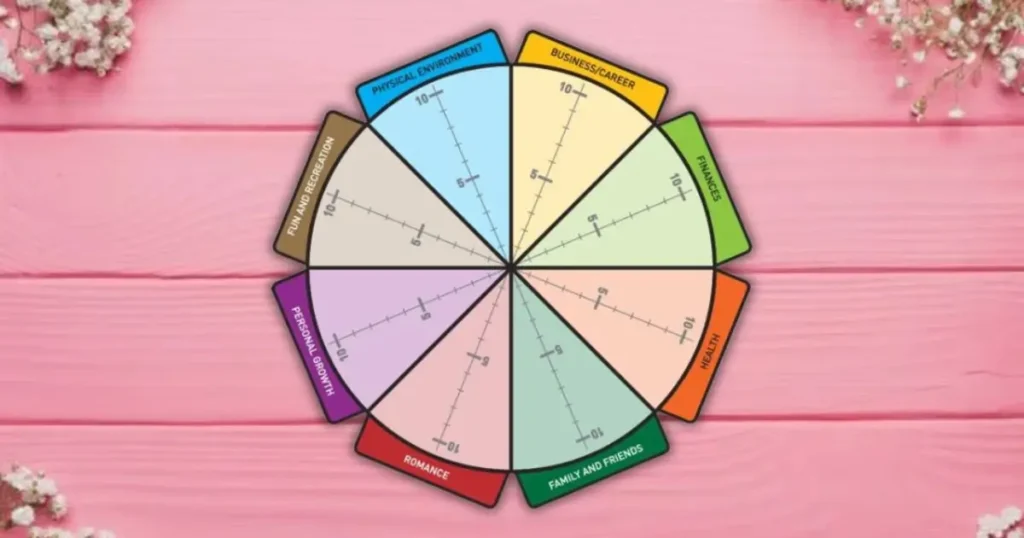Ever felt like there’s not enough time to do everything you want? Or maybe you feel unfulfilled, even after reaching some goals? You’re not alone in this feeling. Many of us struggle to balance our lives, often ignoring important areas of life that need our focus.
But what if you knew the key to a fulfilling life? In this guide, we’ll explore the essential areas of life. You’ll learn how to make your life more balanced and satisfying. By the end, you’ll know how to use your time, energy, and resources wisely, aligning with your values and goals.
Table of Contents
Let’s start this journey to unlock your full potential in every area of your life. Get ready to find a more meaningful and enriching path ahead.
Why Finding areas of life balance Matters
Keeping your life in balance is crucial for your happiness and well-being. If you don’t, it can harm your mental, physical, and emotional health. But, finding balance can bring you deep joy and satisfaction.
The Impact of Imbalance on Personal Well-being
Life imbalance can cause stress, burnout, and a feeling of emptiness. Studies show that spending time on life outside work boosts work performance. Focusing too much on one area, like work, can hurt your health, relationships, and personal growth.
Living a balanced life improves focus, motivation, and overall happiness. Those who struggle with balance often feel tired, disconnected, and unhappy. Ariana Huffington believes that a well-rounded life and high performance go hand in hand.

“Living a well-rounded life doesn’t come at the expense of high performance; in fact, a balanced life actually boosts performance.” – Ariana Huffington
To find true personal satisfaction, you need to care for all areas of life equally. Recognizing the importance of life balance and tackling imbalance can lead to a more fulfilling life.
Understanding the Areas of Life
To achieve balance and happiness, it’s essential to understand the main areas of life. These areas form a “wheel of life,” and by nurturing each part, we can build a more fulfilling and resilient lifestyle. Key aspects include Health and Wellness, Relationships, and Career. Each area contributes uniquely to our happiness and personal growth, impacting how we navigate daily challenges and celebrate achievements.
Health and Wellness
Our health is a foundation for everything else we aim to accomplish. This area encompasses not only physical fitness but also mental, emotional, and even spiritual well-being. Physical health involves daily exercise, a nutritious diet, and good sleep habits, each helping us feel energized and resilient.
Mental and emotional health are equally crucial, involving stress management and emotional awareness to maintain a positive mindset. For instance, setting aside time for mindfulness or meditation can help us stay centered while learning new skills keeps our intellectual health sharp and engaged. Small, consistent steps in this area, such as practicing gratitude, exercising, or simply getting enough rest, create a stable base that fuels progress in all other parts of life.
Relationships and Social Connections
Human connections add meaning and richness to our lives. Our relationships can range from family bonds and close friendships to work colleagues and community members. Social connections impact our emotional well-being, giving us a sense of belonging and support.
For example, while some people find fulfillment in nurturing family ties, others find joy in their social groups, professional networks, or hobbies that introduce them to like-minded people. Building strong, positive relationships can lead to a support system that helps us through tough times and celebrates with us in joyful moments. Regular quality time with friends or family, meaningful conversations, or participating in social activities are just a few ways we can nurture this area for a balanced and happy life.
Career and Professional Growth
Our careers often take up a substantial portion of our time, impacting our sense of purpose, financial stability, and personal growth. For many, professional achievements and a rewarding work life are essential, providing a sense of accomplishment and progression. However, career priorities can sometimes overwhelm other areas of life, making it important to strike a balance. This could mean setting boundaries to ensure time for personal pursuits or pursuing a career path that aligns with our core values.
For example, someone might feel fulfilled in a high-energy corporate role, while another may find joy in a creative, flexible job. Finding ways to integrate personal goals within a professional framework—such as taking a lunch break for a quick workout or attending a family event despite work obligations—can help us sustain a more balanced, rewarding life overall. This approach helps us lead a more balanced and fulfilling life.
| Life Area | Description | Potential Imbalance Impacts |
|---|---|---|
| Health and Wellness | Encompasses physical, mental, emotional, and spiritual well-being | Poor physical and mental health, decreased quality of life |
| Relationships and Social Connections | Focuses on nurturing bonds with family, friends, and community | Feelings of isolation, lack of social support, strained personal relationships |
| Career and Professional Growth | Involves finding fulfillment and advancement in one’s work | Job dissatisfaction, burnout, limited personal and financial growth |

“Prioritizing mental health leads to a more positive quality of life.” – Dr. Michael Roubicek
Assessing Your Current Life Balance
Having a balanced life is key to feeling good and fulfilled. The Wheel of Life is a great tool for checking how balanced you are in different areas of life. It looks at 8 main areas of life: physical, business, finances, health, family and friends, romance, personal growth, fun, and recreation.
The Wheel of Life Exercise
To start your life balance assessment, think about each area and rate your satisfaction from 0 to 10. After scoring, draw a Wheel of Life to see your current personal satisfaction evaluation. This will show you which areas of life are doing well and which need work.
- Physical: Focusing on your body’s well-being, including fitness, nutrition, and energy levels.
- Business/Career: Emphasizing career satisfaction, work-life balance, and professional achievements.
- Finances: Managing financial stability, savings, and security for a worry-free future.
- Health: Prioritizing both physical and mental health to maintain vitality and resilience.
- Family and Friends: Building meaningful, supportive relationships with loved ones and close friends.
- Romance: Fostering intimacy, trust, and fulfillment in romantic relationships.
- Personal Growth: Developing self-awareness, knowledge, and skills to reach your potential.
- Fun and Recreation: Enjoying hobbies, relaxation, and leisure activities that bring joy and reduce stress.

By carefully evaluating each area, you’ll understand your current life balance better. This will help you spot where you need to focus more. It’s a great first step to setting goals and finding ways to live a more balanced and happy life.
“The Wheel of Life is a valuable tool for visualizing and addressing the various facets of your life, helping you achieve a more balanced and fulfilling existence.”
Setting Priorities and Goals
As you aim for a more balanced life, setting priorities and goals is key. This step helps you focus on what’s most important. It guides you in fixing any imbalances. By aligning your goals with your values, you start a journey to a more fulfilling life.
First, think about your current life balance. Figure out where you need to improve. This could be your health, relationships, or career. Choose what’s most important to you and affects your well-being the most.
- Identify your top 5 priorities: Pick the areas of life that matter most to you. These goals can be either short-term or long-term.
- Set specific, measurable, and achievable goals: Use the SMART method to make goals that are realistic and match your priorities.
- Create an action plan: Make a detailed plan for achieving your goals. Break big goals into smaller tasks.
- Review and adjust regularly: Your priorities and goals can change. Keep updating them to stay on track.
Setting priorities and goals is an ongoing process. It’s about constantly reflecting and adjusting to life’s changes. This way, you move closer to a balanced and fulfilling life.
| Short-Term Goals | Long-Term Goals |
|---|---|
| Improve sleep quality by establishing a consistent bedtime routine | Transition to a healthier career path that aligns with your values and passions |
| Reconnect with close friends by scheduling regular social gatherings | Strengthen your financial stability by increasing savings and reducing debt |
| Enroll in a professional development course to enhance your skills | Plan and take a dream vacation with your family or loved ones |
“The essential step is not to fit your schedule around tasks, but to structure your schedule around what truly matters.” – Stephen R. Covey
By setting priorities and goals, you take steps towards a balanced and fulfilling life. Keep in mind, the journey holds as much value as the destination. Enjoy the growth and learning along the way.
Strategies for Achieving Balance
Keeping a healthy balance between work and life is key to your well-being and success. Using good time management, stress reduction, and self-care can lead to a more balanced life. This balance brings joy and fulfillment to your daily life.
Time Management Techniques
Managing your time well means prioritizing tasks and using tools to stay organized. Tools like Calendly, Zoho Bookings, and Kumospace are great for balancing work and life. It takes about three months to make time management a habit.
- Prioritize tasks based on importance and urgency
- Utilize productivity apps and tools to simplify and enhance your workflow
- Establish clear boundaries around work hours and communication
Stress Management and Self-Care
Reducing stress and taking care of yourself is vital for balance. Setting boundaries, focusing on what matters most, and staying positive is important. To stay balanced, exercise regularly, meditate, sleep well, and spend time with loved ones.
| Stress Reduction Methods | Self-Care Practices |
|---|---|
| Mindfulness and meditation Regular exercise Work-life separation | Adequate sleep Balanced nutrition Hobby and leisure time |
By using these work-life balance strategies, time management skills, stress reduction methods, and self-care practices, you can live a more balanced and fulfilling life. This balance supports your personal and professional goals.
Overcoming Obstacles and Challenges
Life is a mix of highs and lows. Achieving balance in your life can be challenging. But, with the right mindset and strategies, you can beat these challenges and keep moving towards happiness.
One big challenge is handling many responsibilities at once. This could be work, family, or taking care of yourself. To manage, learn to prioritize, and say no when needed. This allows you to maintain focus and prevent feelings of being overwhelmed.
Another hurdle is negative thoughts or beliefs that hold you back. These thoughts can hinder your progress toward achieving your goals. By seeing challenges as chances to grow, you can break free from these limits.
- Be a problem solver: When obstacles arise, be ready to find solutions. Break down big problems into smaller steps and try different ways to solve them.
- Be adaptable: Life is full of surprises. Learn to adjust your plans when things change. This way, you can handle unexpected events better.
- Get support: You don’t have to face challenges alone. Talk to friends, family, or experts for help. Working together can bring new ideas and support.
With a positive attitude, smart problem-solving, and support from others, you can beat life’s challenges. Keep moving forward, celebrate your wins, and always keep your goals in mind.
Remember, obstacles are chances to grow and get stronger. Face each challenge with a will to learn and adapt. By using these strategies, you’ll find balance and happiness in your life.
Continuous Improvement
Life-long learning and adaptability mean seeing change as a chance to grow. The journey to balance is an iterative process. It asks for a readiness to reassess, adjust, and grow with life’s changes.
Periodic Reassessment and Adjustment
Regularly checking the Wheel of Life reassessment offers insights into areas of life needing more focus. With an open and curious mind, you can spot imbalances and plan to fix them.
- X% of respondents found embracing change key to their fulfillment.
- Y% faced initial resistance but saw change as a progress ally.
- Z% said challenges from change tested their limits and pushed them further.
Life is always changing, and what works today might need tweaking tomorrow. Be ready to adapt, celebrate your wins, and keep aiming for a more balanced life.
“Embracing change is an ongoing commitment to personal growth and self-improvement.”
Companies using structured change management, like the ADKAR model, see a 70% success rate. This method, focusing on awareness, desire, knowledge, ability, and reinforcement, helps in personal growth too.
By always looking to improve, you can handle life’s ups and downs better. This unlocks your full potential for a balanced and fulfilling life.
Conclusion
This guide has covered the main areas of life and why balance is key for well-being and happiness. By knowing the different life domains, checking your current balance, and setting goals, you can start a journey to a better life. Overcoming challenges, accepting change, and always getting better is crucial for keeping balance and living a life that matches your values.
We’ve shown how important life balance is for your overall happiness. By focusing on health, relationships, and work, you can live a more fulfilling life. Remember, finding life balance is a personal journey. It needs self-reflection, setting goals, and being open to change.
As you continue, remember the tips and insights from this article. Use time and stress management, and always look for ways to improve. Celebrate your achievements, learn from failures, and keep growing. This way, you’ll open up new possibilities and reach your full potential, leading to a balanced and successful life.
check out these related articles:

